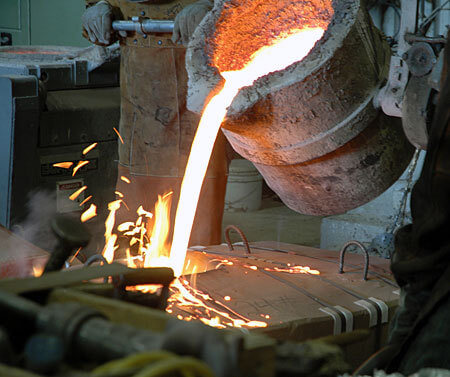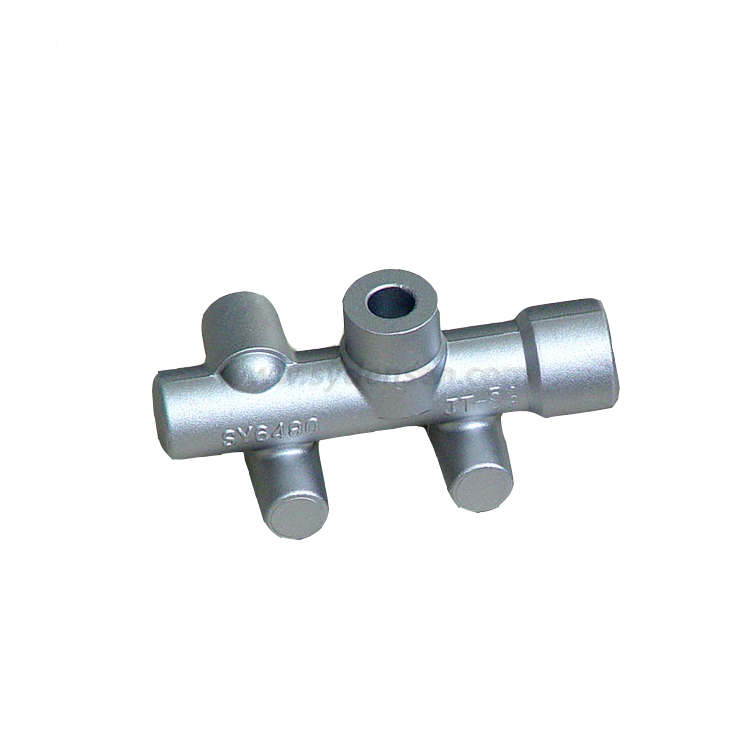Detailed Process of Aluminum Foundry from Start to Finish
Discover the Benefits of Aluminum Casting in Modern Production
Aluminum casting has actually become a critical procedure in modern-day manufacturing. Its lightweight yet robust nature provides substantial advantages for numerous sectors. The capability to accomplish elaborate designs and maintain tight tolerances contributes to its appeal. Precision aluminum casting. Additionally, the cost-effectiveness and ecological benefits make it a sustainable option. As suppliers look for innovative services, the function of aluminum casting remains to progress. What certain applications and advantages await expedition in this vibrant field?
Lightweight Yet Strong: The Benefits of Aluminum
Although numerous materials are used in manufacturing, aluminum attracts attention because of its exceptional mix of light-weight homes and exceptional strength. This special quality makes aluminum an excellent selection for different applications, especially in industries such as automotive, aerospace, and construction. Its reduced thickness enables easier handling and transport, adding to reduced power consumption throughout production and setting up processes.
Aluminum's strength-to-weight ratio is excellent, making it possible for manufacturers to develop durable elements without including unnecessary bulk. This particular is especially beneficial in sectors where weight decrease can bring about enhanced gas efficiency and general performance. Additionally, aluminum's resistance to deterioration enhances the long life of products, better solidifying its charm in modern production.
Ultimately, the light-weight yet strong nature of aluminum placements it as a preferred material, cultivating development and effectiveness throughout several fields. Producers significantly recognize that these advantages can result in substantial developments in layout and capability.
Precision and Complexity in Style
As suppliers embrace the capabilities of aluminum casting, they find new opportunities for precision and intricacy in layout. This manufacturing procedure permits the creation of intricate shapes and comprehensive attributes that standard methods typically struggle to achieve. The fluidity of molten aluminum allows it to fill up intricate molds, resulting in components with tight resistances and great surface finishes.
This precision is especially valuable in industries such as aerospace and vehicle, where specific requirements are necessary for performance and safety and security. Aluminum casting additionally suits ingenious styles that enhance capability without endangering architectural honesty.

Cost-Effectiveness and Efficiency
Cost-effectiveness and efficiency are extremely important considerations for manufacturers checking out aluminum casting as a manufacturing approach. Aluminum casting offers considerable expense benefits as a result of its lower material expenses contrasted to various other metals (Aluminum Foundry). The light-weight nature of aluminum reduces shipping and handling expenses, and its exceptional thermal conductivity permits quicker cooling times during the casting process, improving general manufacturing rate
Additionally, aluminum's adaptability makes it possible for makers to produce complicated shapes and designs, minimizing the need for additional machining or assembly. This streamlining of production not only reduces labor costs however also shortens lead times, allowing companies to respond swiftly to market demands.
Additionally, the longevity and deterioration resistance of aluminum spreadings dig this add to longer item life-spans, lowering replacement prices gradually. Therefore, manufacturers can attain a balance of top quality output and reduced functional expenditures, making aluminum casting a significantly eye-catching choice in contemporary manufacturing.
Environmental Sustainability of Aluminum Casting
Aluminum casting stands out as an environmentally lasting production option, specifically because of its recyclability and decreased environmental footprint. The process enables the effective use aluminum, a material that can be recycled forever without losing its residential or commercial properties. This particular considerably decreases the need for virgin aluminum, consequently reducing and preserving all-natural resources energy intake related to removal and handling.

Applications Throughout Industries: From Automotive to Aerospace
While varied sectors remain to look for cutting-edge materials for production, aluminum casting has proven to be a functional option across sectors such as auto and aerospace. In the vehicle market, aluminum castings add to lightweight lorry styles, enhancing gas efficiency and performance. Elements like engine blocks, transmission housings, and wheels gain from aluminum's strength-to-weight ratio.
In aerospace, aluminum casting plays a significant duty in producing intricate parts that need high resilience and reduced weight. Aircraft elements such as braces, touchdown equipment, and architectural frames use aluminum for peak performance and safety and security.
Moreover, the flexibility of aluminum casting permits it to satisfy other sectors, consisting of consumer electronic devices, find out aquatic, and industrial equipment. This adaptability not only fulfills the particular requirements of numerous applications but additionally supports ongoing technology in producing processes. Because of this, aluminum casting stays a vital player in modern-day manufacturing throughout numerous markets.
Frequently Asked Inquiries
How Does Aluminum Casting Contrast to Other Steel Casting Processes?
Aluminum casting deals superior strength-to-weight ratios, faster air conditioning rates, and exceptional corrosion resistance contrasted to other metal casting procedures. These advantages make it suitable for various applications, enhancing efficiency and performance in manufacturing.
What Are the Typical Lead Times for Aluminum Casting Projects?
Common lead times for aluminum casting tasks vary from 2 to 8 weeks, depending on variables such as intricacy, order size, and production capacity. Reliable preparation can assist reduce delays and boost job timelines.
Can Aluminum Casting Be Utilized for Intricate Designs?
Aluminum casting can undoubtedly fit detailed layouts. Aluminum Foundry. Its fluidness permits detailed patterns and forms, making it ideal for complex elements in different sectors. This versatility improves design flexibility while keeping architectural honesty and performance
What Post-Processing Options Are Offered After Aluminum Casting?
Post-processing options for aluminum casting include machining, brightening, surface area treatments, anodizing, and welding. These strategies boost the surface, boost dimensional precision, and increase deterioration resistance, consequently enhancing the final item's performance and visual appeal.
How Do Temperature Level Changes Affect Aluminum Casting Quality?
Temperature level changes considerably effect aluminum casting high quality by impacting fluidity, solidification rates, and potential defects. Quick cooling can result in boosted brittleness, while extreme warmth might create warping or incomplete filling of mold and mildews throughout casting.
Aluminum casting has actually emerged as an essential process in contemporary production. As makers accept the capabilities of aluminum casting, they discover brand-new opportunities for precision and complexity in design. Aluminum casting procedures generally generate less greenhouse gas discharges compared to various other steel casting techniques. While varied markets continue to look for innovative materials for production, aluminum casting has actually proven to be a flexible remedy across recommended you read industries such as auto and aerospace. In the automotive market, aluminum spreadings add to lightweight automobile layouts, boosting fuel efficiency and performance.